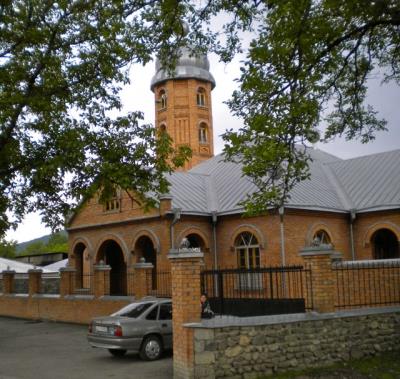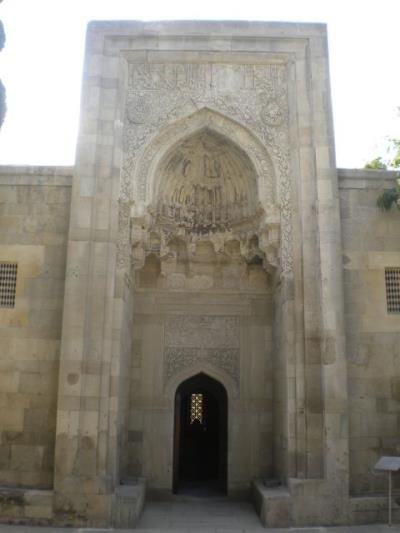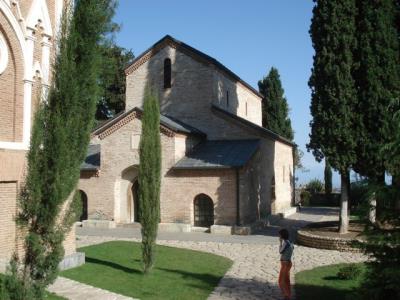History: Religion in the Caucasus - Post Soviet Influence
Armenia was the first country in the world to adopt Christianity has state religion, in 301. The founder of the Armenian apostolic church was Saint Gregory the Illuminator, who was appointed catholicos in 301. The present catholicos is Karekin II. The religious centre for the Armenians is the cathedral of Etchmiadzin. Following the Armenian genocide in Turkey in 1915, the Armenian church has remained a strong uniting force of the Armenian diaspora population. A prime example of this unifying force can be seen with the emergence of the Armenian church in America.
Although the population of Azerbaijan is predominantely muslim, the country has a history of diverse religious influences. For instance, Azerbaijan was known as an ancient center of Zoroastrianism. Both Sunni and Shia muslims are represented in Azerbaijan, but predominantly Shia (Valiyev).
Both in the North (Halbach 2001) and South Caucasus there has been a clear revival of religion with the building of new churches and mosques during the Post-Soviet period. The development in the North has been characterized by increasing fundamentalism and violence. Discussion of Islam and radicalization in South Caucasus centering around Georgia's Pankisi gorge.

New mosque in Georgian Pankisi, bordering to Chechnya

Shah mosque in Baku

Bodbi monastery with Saint Nino's grave
The trust in religious institution is high in the South Caucasian republics and so is the estimated importance of importance of religion in daily life (statistics in Charles 2010), whereas half of the population attend religious services only on special occasions.
The video shows the ceremony of baptizing godchildren of the Georgian catholicos Ilia II. He baptises the third child in all famililies; so far this includes almost 7000 Georgian children. The ceremony takes place in the newly built Trinity church in Tbilisi.
There is a mixed and complex picture with respect to Christianity and Islam in some regions of the Caucasus, for instance, in Abkhazia. Christianity was established in Western Georgia in the beginning of the 4th century. Due to Turkish influence from the 16th century, Islam increased in importance in the coastal region. Following the Russian-Turkish war and the Russian victory, many Abkhaz Muslims were forced to emigrate to the Ottoman empire. However, Muslim traditions remained side by side with Christian institutions. In contrast to Russia's recognition of the independence of Abkhazia and South Ossetia, the Russian orthodox church has chosen to respect the authority of the Georgian church in both regions (news link). The Georgian church has been led by the Patriarch Ilia II for over 35 years.
Recommended Literature:
Charles, Robia. Religiosity in Armenia, Georgia and Azerbaijan. Caucasus Analytical Digest. No 20: Religion in the South Caucasus, 2010. pp. 2-6- http://www.css.ethz.ch/content/dam/ethz/special-interest/gess/cis/center-for-securities-studies/pdfs/CAD-20.pdf
Halbach, Uwe, Islam in the North Caucasus, Archives de sciences sociales des religions, 2001, pp. 93-110. http://assr.revues.org/18403#tocto1n
Rovshenoglu, Kenan and Bayram Balci, 2013. Syria, Azerbaijan and the Sunni-Shia Divide. How is Syria’s war dividing populations across the region? September, 6. The Globalist. http://www.theglobalist.com/syria-azerbaijan-sunni-shia-divide/
Thanks @fugetaboutit, Interesting story
i wanna know more about ISLAM
please mention me in your next posts related to teh subject
Your post is excellent! Everything you wrote is true!
I just have to supplement it. After the genocide you mentioned, Armenians do not want friendship with any Muslim country. Especially with Turkey, which denies genocide. Throughout history, my nation also had a bad experience with Turkey, and we are also very cautious about them. In my post on the Bridge on the Drina I wrote about the evil that they have done us for centuries.
You said that Azerbaijan is a Shiite state. They are also cautious when it comes to relations with the Sunni countries. In the territories where the Islamic State was (Iraq, Syria) all Shiites were sentenced to death. The better treatment was for Christians.
Thanks for the additional input. It is always good to hear personal experiences which often better reflects the truth when it comes to history. It is such a shame that historical references to many tragic events are often politicized by the victors in any conflict. This seems to be the method all collective societies perpetuate. In order to combat this you need more people with direct experience in events to speak about it, write it and ensure their voice is never silenced or forgotten.